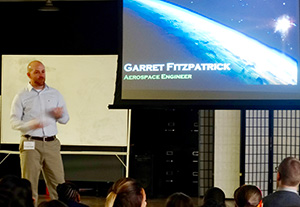
Aerospace engineer Garret Fitzpatrick encourages students to “make the impossible come true”
In 1961, no one would have associated the term “stem” with anything other than a flower. Yet that was the year that the real-life protagonists of the award-winning film Hidden Figures became unwitting pioneers in the movement to inspire students’ interest in science, technology, engineering, and math (STEM) careers some half a century later.
Paul Cuffee Middle School students recently saw the film Hidden Figures as part of an interdisciplinary field trip. “The movie connected to the curriculum in science, math, and humanities,” says 8th grade math teacher Matt Black.

Garret Fitzpatrick in the spacesuit he helped design for astronauts.
Students learned about three African-American women, Katherine Johnson, Dorothy Vaughn, and Mary Jackson, who were integral parts of NASA during the space race of the late 1950s and early 1960s. “They were inspired to learn about how the women overcame segregation and sexist notions about the capabilities of women to contribute important work in math, engineering, and computer coding,” notes Mr. Black. “They were excited to recognize that some of the concepts they have begun to learn about in math and science were used to help launch the first Americans into space and eventually to the moon.”
If the space race from a prior generation was too remote for the students, Mr. Black had a reinforcement up his sleeve. He brought in a friend, aerospace engineer Garret Fitzpatrick, to visit with the students just before their trip to the movie. Fitzpatrick worked at NASA for more than 10 years, where he was part of a team that helped design the spacesuits worn by today’s astronauts. He also worked on science experiments for use on the International Space Station.
While at Cuffee, Fitzpatrick spoke about how his interest in space began when he saw the movie Star Wars as a child. He told the students that he loved working at NASA because he got to help “make the impossible come true.”
His message to the students? If they work hard and follow their goals, they can one day have an exciting career using the skills they learn in school. In short, they too can make the impossible come true.
Contributor: Matt Black, MS math teacher


